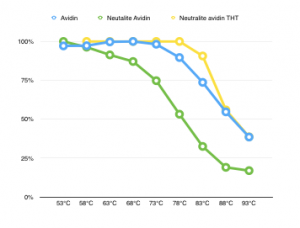neutralite avidin high temperature resistance
High Temperature Resistance : Superior Performance of Neutralite Avidin
In 2015, e-Proteins launched a R&D program to meet customer requirements for high-temperature coating applications. We focused on comparing the heat stability of avidin, Neutralite Avidin, and n-ULtraCoat70 in a 50mM NaPi pH 7.0 setting. Our team determined Delta(50), the temperature causing a 50% loss of initial activity after 30 minutes.
Our efforts led to the development of NLA-H, which surpasses both Neutralite Avidin and streptavidin in heat stability. NLA-H shows a significant Delta(50) improvement, reaching approximately 83°C after 30 minutes. Building on this, we are developing NLA-XH, aiming to match the remarkable heat stability of native avidin, around 89°C over 30 minutes.
Currently, these new derivatives exhibit high temperature resistance, but they lose 15% of their activity after 48 hours. Our team is actively working to stabilize these products over time, ensuring they meet the high-temperature demands of our clients.

Neutralite Avidin Shows Higher Temperature Resistancecompared to native avidin
Expanding Applications of Heat-Resistant Neutralite Avidin in Biology
The high-temperature-resistant Neutralite Avidin has opened up a plethora of opportunities in various biological applications where high temperature resistance is essential. This enhanced feature makes it an ideal candidate in several key areas.
Firstly, in Polymerase Chain Reactions (PCR), where thermal cycling is a fundamental process, the heat-resistant Neutralite Avidin can play a crucial role. Its ability to maintain functionality at elevated temperatures ensures more efficient binding and signal amplification, leading to more accurate DNA amplification results.
Secondly, in protein purification processes, especially those involving heat treatment to inactivate other proteins or contaminants, this form of Neutralite Avidin stands out. Its high temperature resitance allows it to remain active and effective in binding biotinylated molecules, even after heat treatments that would denature most proteins.
Additionally, in the field of immunohistochemistry, where tissue samples often undergo heat-induced antigen retrieval, Neutralite Avidin’s heat resistance is highly advantageous. It ensures that the binding of biotinylated antibodies to their targets is not compromised during the heating process, leading to clearer and more reliable staining results.
Moreover, in biosensor development, particularly in environments with fluctuating or high temperatures, Neutralite Avidin can significantly enhance the performance and stability of biosensors. Its ability to withstand high temperatures without losing activity ensures consistent and reliable biosensor readings.
Lastly, in food science and safety testing, where samples are frequently exposed to high temperatures during analysis, Neutralite Avidin’s heat resistance ensures it remains an effective tool for detecting biotin-labeled compounds in various assays.
In conclusion,the Neutralite Avidin’s high temperature resistance is a versatile tool
the new Neutralite Avidin derivative marks a breakthrough in protein stability at high temperatures. Surpassing native avidin, known for its heat resistance, this development highlights e-Proteins’ commitment to innovative research. We have set a new industry standard, offering a product that maintains functionality in extreme temperatures. This advancement underlines our dedication to providing cutting-edge solutions, effectively responding to the evolving needs of our customers.
